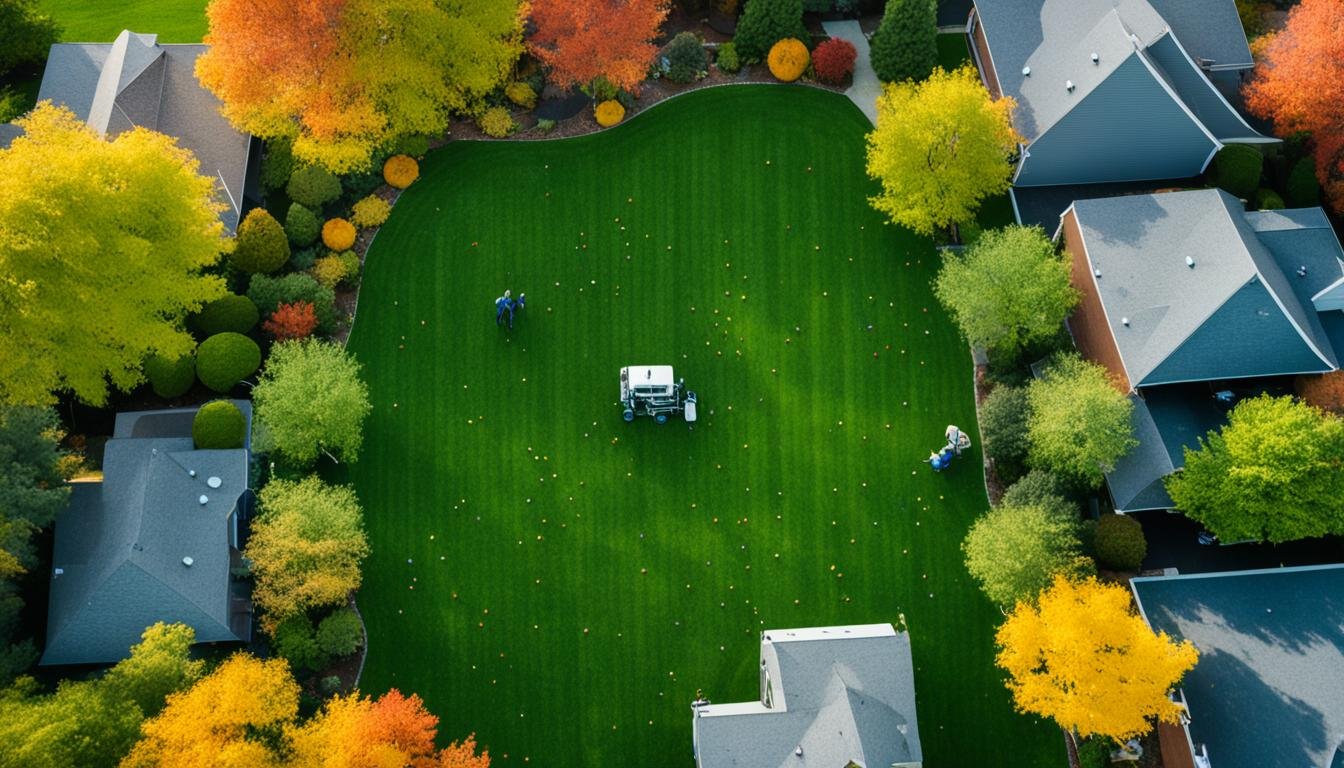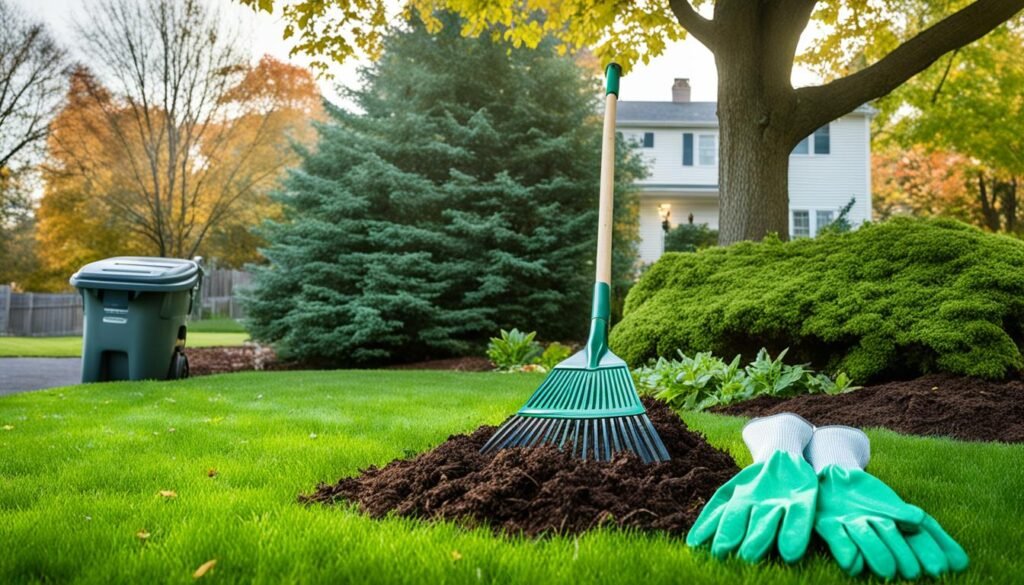
Did you know that traditional lawn care methods can have a significant negative impact on the environment? In fact, according to the Environmental Protection Agency, residential lawns in the United States are treated with an estimated 90 million pounds of synthetic pesticides each year. These chemicals not only harm the soil and water systems but also pose potential risks to human health. It’s time to make a change and embrace organic fall lawn care practices that are not only better for the environment but also promote a healthier and more sustainable yard.
Key Takeaways:
- Organic fall lawn care practices are essential for creating a greener and more sustainable yard.
- By eliminating synthetic pesticides and fertilizers, you can reduce the negative impact on the environment and human health.
- Conducting a soil test and using organic amendments can help nourish your lawn naturally.
- Composting and using organic fertilizers promote healthy soil and grass growth.
- Selecting native or organic grass seed and implementing organic weed and pest control methods contribute to an eco-friendly yard.
Tips for Organic Fall Lawn Care
When it comes to organic fall lawn care, there are several key practices you can follow to ensure a healthy and sustainable yard. By embracing organic methods, you can maintain a beautiful lawn without relying on synthetic chemicals and harmful additives. Here are some essential tips for organic fall lawn care:
- Start with a soil test: Conducting a soil test is crucial in understanding the specific nutrient deficiencies your lawn may have. This will help you determine the necessary amendments to improve the soil quality and promote healthy grass growth.
- Embrace composting: Composting is an effective way to add organic matter to the soil, enhance its structure, and provide beneficial organisms. By incorporating compost into your lawn, you can improve soil fertility and encourage a thriving ecosystem.
- Choose organic lawn fertilizers: Opt for organic lawn fertilizers that contain natural ingredients such as seaweed, bone meal, and feather meal. These fertilizers provide a slow-release of nutrients, promoting long-term lawn health without the use of synthetic chemicals.
- Overseed bare areas: Fill in bare or thin areas of your lawn by overseeding with a quality seed mix suitable for your climate. This helps prevent weed growth and promotes a lush, dense lawn.
- Consider native or organic grass seed: For a more sustainable lawn, consider using native or organic grass seed that is adapted to your local soil conditions. These varieties require less water and maintenance, making them a greener choice.
- Deal with weeds and pests organically: Instead of relying on synthetic herbicides, opt for organic methods to tackle weeds and pests. This can include using corn gluten meal as a weed preventative, manually pulling weeds, or utilizing organic weed killers.
- Maintain proper mowing and watering: Set your mower to the appropriate height for your grass type and mow regularly to ensure optimal growth. Additionally, water deeply but infrequently to encourage deep root development and avoid excessive water usage.
By implementing these tips for organic fall lawn care, you can create a sustainable and eco-friendly yard that thrives naturally. Say goodbye to synthetic chemicals and embrace a greener approach to lawn maintenance.

The Power of Organic Lawn Care
Organic fall lawn care is not only beneficial for your yard but also for the environment. By choosing eco-friendly yard care practices, you contribute to a healthier ecosystem and reduce your carbon footprint. Organic lawn maintenance promotes biodiversity, attracts beneficial organisms, and reduces water consumption. It’s a holistic approach that nurtures your lawn while preserving the natural balance of the environment. Embrace sustainable autumn lawn care and enjoy a lush, green lawn that you can feel good about.
Benefits of Organic Fall Lawn Care
Choosing organic fall lawn care practices offers numerous benefits. It is not only environmentally friendly but also safer for your lawn and family. Organic lawn care focuses on improving the health of the soil, which in turn leads to a healthier, more sustainable lawn.
By eliminating the use of synthetic fertilizers, pesticides, and herbicides, you can create a yard that is free from harmful chemicals. This means a safer environment for your children and pets to play in, without the worry of exposing them to toxic substances. Organic lawn care also promotes biodiversity by attracting beneficial organisms to your yard, creating a natural balance that reduces the need for chemical intervention.
Additionally, organic practices help conserve water. Organic lawns have deeper, stronger roots that can better withstand drought conditions, reducing the need for excessive watering. This not only saves on water usage but also lowers your water bills. By following organic fall lawn care practices, you can enjoy a beautiful and vibrant lawn while minimizing your impact on the environment.
Make the switch to organic fall lawn care today and experience the benefits of a greener, healthier, and eco-friendly yard!






No comment yet, add your voice below!